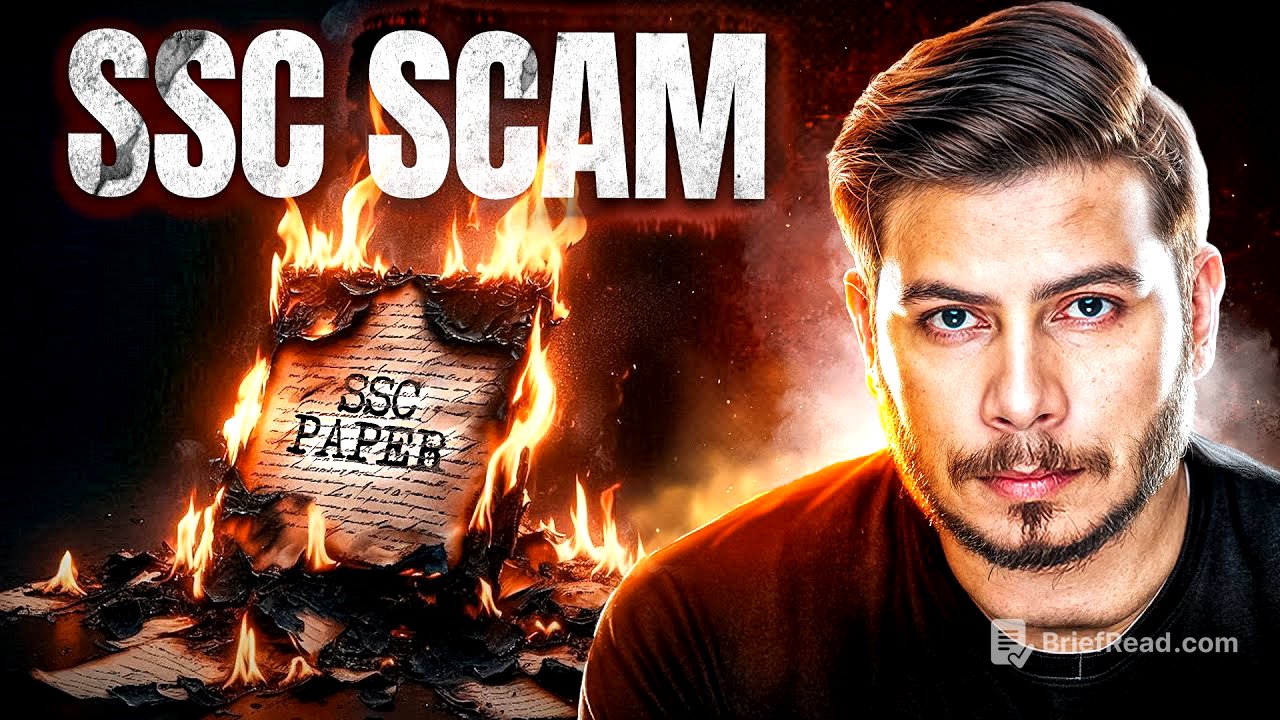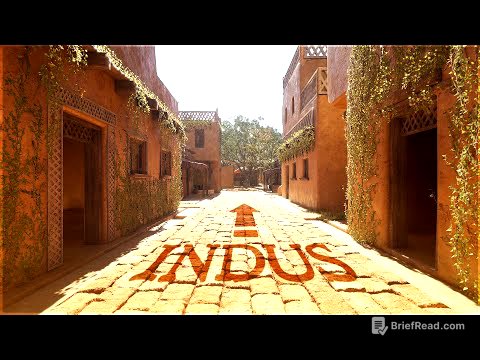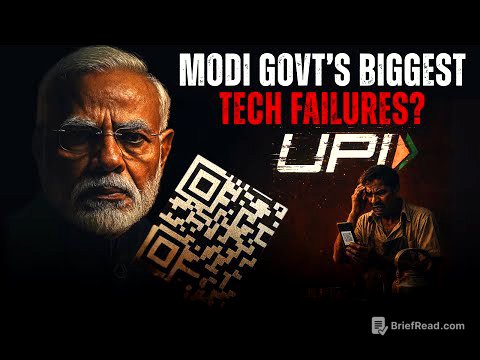TLDR;
The video talks about the controversies surrounding the Staff Selection Commission (SSC) exams in India, particularly focusing on the involvement of a company called Eduquity. It highlights how Eduquity, initially a small player, managed to win significant government tenders, often under questionable circumstances and rule changes that seemed to favour them. The video also discusses the problems faced by students during these exams, including technical glitches, paper leaks, and logistical issues, and questions the fairness and transparency of the entire process.
- Eduquity's rise from a small company to a major player in government exam tenders.
- Controversial rule changes in tenders that seemed to benefit Eduquity.
- Problems faced by students during SSC exams conducted by Eduquity, including technical issues and logistical nightmares.
- Allegations of corruption and favouritism in the awarding of tenders.
- The impact of these issues on students from underprivileged backgrounds.
Intro [0:00]
The video starts by questioning how Eduquity, a company that started with a revenue of ₹7 crores, grew to ₹135 crores, and why it consistently won tenders in states governed by the BJP. It mentions that an NGO run by BJP MLA Sanjeev Khuswaha was associated with an NRI college, further fueling the controversy. The intro also highlights that Eduquity lost several tenders initially, which were then cancelled, rules were changed, and Eduquity won the tender again.
Importance of Fair Recruitment Process [2:17]
Before independence, the Federal Public Service Commission (FPSC) handled government job exams, but it was marred by racial discrimination and political interference. After independence, the Union Public Service Commission (UPSC) was established in 1950 under Constitutional Status Article 315-323 to ensure fair recruitment for top-level government jobs like IAS and IPS. However, a centralized body for subordinate-level jobs was not initially created, leading to departments and states announcing vacancies with different syllabi and exams. To address this, the Subordinate Services Commission (SSC) was formed in 1975, later renamed Staff Selection Commission in 1977, to conduct common exams for same-rank jobs. Unlike UPSC, SSC was not under Constitutional Articles, making it susceptible to governmental influence.
SSC and the Entry of Private Players [4:45]
Initially, SSC operated without private players, conducting offline exams with government-appointed examiners and secure printing of question papers. By 2000, increased applications led to mismanagement and paper leaks. In 2015, after a major paper leak in 2013, it was decided to conduct SSC exams through Computer Based Tests (CBT) to enhance security. This required digital infrastructure, including computer labs and secure exam software, which the government lacked. Consequently, private companies entered SSC to provide these services.
SIFY Technologies and the First CBT Tender [7:12]
On January 15, 2016, SSC issued a tender for CBT, requiring applicants to have an average turnover of ₹75 crores in 3 years and 4 years of experience in conducting computer-based exams. SIFY Technologies Ltd. won the tender on April 12, 2016. However, the exams starting August 27, 2016, faced issues like server downtime and system freezes. Cheating cases using Anydesk software surfaced, and question paper images went viral. An FIR was filed against 17 people, including 10 SIFY employees, and the case was handed over to the CBI.
TCS Takes Over SSC Exams [8:52]
In 2018, SSC decided to award the tender to a larger, more stable company. The tender rules were hardcoded, creating two categories: companies with experience conducting exams for over 50 lakh students and those with less experience. TCS (Tata Consultancy Services) won in both categories due to its experience, infrastructure, and strong network. From 2018, TCS conducted SSC exams smoothly with minimal issues, resolving major problems faced by SSC.
The Rise of Eduquity [10:18]
While TCS was successfully conducting SSC exams, Eduquity Career Technologies Pvt. Ltd. entered the scene. Registered in 2000, Eduquity initially conducted small computer exams. Its turning point came in 2010 when the BJP government in Gujarat replaced MeritTrac with Eduquity for state entrance exams, allegedly for offering lower costs. This Gujarat government project increased Eduquity's exam conducting frequency, leading to national-level exams for BITS Pilani and HAL.
DGT Tender and NTA Tender [11:54]
In 2020, the Directorate General of Training (DGT) issued a tender for skill development exams. Both TCS and Eduquity applied. On June 15, 2020, DGT declared Eduquity ineligible due to its small size and failure to meet the ₹50 crore turnover requirement. Despite this, on November 13, 2020, Eduquity applied for the National Testing Agency (NTA) tender, which conducts larger exams like JEE Main and NEET.
NTA Tender Controversies [13:58]
In the initial NTA tender, Eduquity was rejected in the technical round due to low technical parameters. The tender was then cancelled. Four months later, on April 29, 2021, NTA reissued the tender with changed rules. The IT staff strength requirement was reduced, the average turnover requirement was lowered from ₹50 crores to ₹10 crores, and the requirement for conducting computer-based tests for 1,00,000 students was reduced to 35,000. These changes allowed Eduquity to qualify, and it eventually won the tender by bidding lower than TCS.
Problems with Eduquity-Conducted NTA Exams [17:56]
After winning the NTA tender, Eduquity faced numerous issues. There were technical glitches in exam centers, questions not loading, server failures, and incorrect exam addresses. Students had to approach the Supreme Court, which ordered re-exams for some. Protests occurred, but no significant changes were made.
MPPEB Tender and CMMI Certification [18:39]
Around the same time as the NTA tender, MPPEB (Madhya Pradesh Professional Examination Board) launched a tender. Eduquity and NSEIT applied. In the technical round, Eduquity was given 5 marks for CMMI Level 5 certification. However, Eduquity's website and the CMMI Institute's database showed only CMMI Level 3 certification, and that too of 2024. Eduquity itself admitted in a 2019 pre-bid query that it did not have CMMI certification.
MPPEB Tender Results and Controversies [22:25]
In the initial MPPEB tender, NSEIT scored 97 and Eduquity 83, with NSEIT winning. However, this tender was cancelled on December 16, 2021. In 2022, a new tender was issued, and Eduquity won. After winning, Eduquity handed over the MPTET exam to Sai Educare Pvt. Ltd., a Rajasthan company, violating tender rules. Exams faced server problems, wrong enrollments, and paper leak allegations. Despite complaints and evidence, the government denied the paper leak.
MP Patwari Exam and the NRI College Connection [24:46]
In 2023, Eduquity was also given the MP Patwari exam. The same technical problems and cheating allegations arose. The result showed that 7 out of the top 10 students were from the same NRI college in Gwalior, with roll numbers in the same range. This college was found to be associated with BJP MLA Sanjeev Singh Kushwaha. This led to widespread protests and an inquiry by retired High Court Justice Rajendra Kumar Verma.
Maharashtra and SSC Tenders [27:43]
Despite the controversies in MP, Eduquity was awarded the Maharashtra MBS CET tender in 2023. The SSC exam tender that TCS had won in 2018 was also expiring. SSC issued a new tender with changes in rules that made Eduquity eligible. The student limit was decreased from 50 lakh to 10 lakh, and financial requirements were eased, benefiting Eduquity.
More Rule Changes in SSC Tender [31:11]
Further rule changes were made, including allowing "ancillary services" and "networking and hardware support," which opened the door for subcontracting. The CMMI certification requirement was changed, reducing marks for companies with certifications in both Development and Services, disadvantaging TCS.
Technical Assessment and Tender Cancellation [34:26]
In the technical assessment, TCS scored higher than Eduquity. However, the financial round was not conducted, and the entire tender was cancelled in July 2024. This pattern of cancelling tenders after Eduquity lost was questioned.
SSC Re-tender and Further Rule Changes [38:34]
SSC issued a new tender on November 28, 2024, with more changes. The two categories were merged into one, and the requirement for a government agency certification stating the company wasn't blacklisted was removed. The weightage for technical rounds was reduced, and financial weightage was increased.
Financial Bidding and Eduquity Wins [42:47]
In the financial round, Eduquity bid significantly lower than TCS, winning the SSC tender. Despite SSC having sufficient funds, it chose Eduquity, saving money but not reducing fees for students. This decision raised concerns about the quality of service students would receive.
Subcontracting and Transparency Issues [46:00]
The new tender allowed for "ancillary services," creating confusion about what constituted core work and enabling potential subcontracting. Companies like Vensysco and Innovatiview were tagged in posts related to SSC exams, raising questions about their involvement.
Innovatiview and Vensysco's Involvement [48:18]
Innovatiview was listed as providing IT infrastructure to Eduquity in its DRHP document. Job postings by consulting companies mentioned Innovatiview and SSC directly, indicating a deeper involvement than just supporting work. Vensysco also posted job openings for conducting government exams, raising further questions.
Problems Faced by Students [51:55]
Students faced numerous issues, including third-grade equipment, untrained staff, non-functional computer labs, and remote exam centers. Students from Rajasthan were assigned centers in Andaman Nicobar. There were complaints about wrong questions, lack of bag storage, and security concerns for female students.
Conclusion [53:01]
The video concludes by highlighting the plight of students from underprivileged backgrounds who rely on SSC exams to improve their lives. It criticizes the discrimination in exams and calls on the government to address these issues to ensure fair and proper exams for all students.









